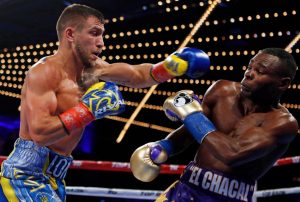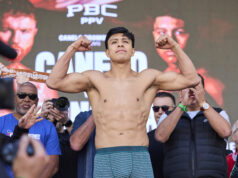By Jimmy Tobin-

Saturday night at Madison Square Garden Vasyl “Hi-Tech” Lomachenko convinced his fourth consecutive opponent to quit on his stool. His victim this time, fellow two-time Olympic gold medalist, Guillermo “El Chacal” Rigondeaux, retired with an injured left hand after the sixth round. What more need be said about the action, lopsided, clinical, predictable as it was?
Much will be made of Rigondeaux’s decision in the aftermath: some will wonder how a fist that seemed never to land could have been damaged, or why trainer Pedro Diaz seemed so ready to act on Rigondeaux’s cue to end the affair. Ringside, Tim Bradley, as honest and polite and warring a prizefighter as we have seen in recent years, voiced such skepticism when Rigondeaux, halfway through the fight but at the threshold of humiliation, chose to preserve a career he says he may pursue no further.
Rigondeaux is a proud man, indeed his disregard for audiences is proof of that; he is also a fighter at heart, something he confirmed in climbing off the canvas to butcher Hisashi Amagasa and in his utter and arrogant defusing of Nonito Donaire. For this, perhaps, his professed injury deserves a courteous ear. But every second of every minute of every round Saturday belonged to Lomachenko, and who could better appreciate that dominance, and the bruising mischief it wrought, than Rigondeaux? Perhaps for the first time in a boxing ring, Rigondeaux was without answers, and that hopelessness, made all the more real by the taunts and mockery that have become part of Lomachenko’s signature, was likely more than he could bear.
Now a 37-year-old (and injured?) persona non grata, Rigondeaux chose to walk away from what was likely his last chance at glory and the remuneration it brings. Yes, Lomachenko held every advantage; size, youth, activity aside, he is simply better than Rigondeaux and employs an ideal style for disrupting the Cuban’s measured violence. The fight Rigondeaux had lobbied so long for was finally his, however, and he revealed how much that opportunity meant to him. Offer whatever apologies for Rigondeaux you like, boxers are held to a higher standard because they have earned that honor, and in capitulating as he did, Rigondeaux showed that however brilliant a fighter he is, barring something remarkable and out of tune with the tenor of his career, greatness will elude him.
Did it also confound and abuse him on this night? Well, not yet. Lomachenko is not yet a great fighter. He has the makings of one, certainly, but dominance alone does not establish greatness—at least not in an eleven fight career that features more losses (one) than it does great opponents. That lone loss, to Orlando Salido, is too frequently glossed over to be forgotten. Yet Lomachenko is no longer the naive and inexperienced fighter that fell for Salido’s dirty charms, and the next man who hangs a defeat on the Ukrainian will accomplish something greater than Salido did. Unlike Rigondeaux, Lomachenko will end his career remembered for more than his amateur achievements.
Still, there is something missing from Lomachenko, or, more charitably, if not from him then at least from his fights. That something was on display this weekend, though.
You could find it in the ring in Hialeah, Florida, where light heavyweight neverender, Jean Pascal, took his first (and hopefully only) leave of the sport knocking out aspiring Ahmed Elbiali. Plenty pulped over the past few years, Pascal nevertheless faced yet another undefeated fighter in Elbiali—his fifth in his last six fights. And as he has done for years, Pascal drew a line in the sand behind which he lobbed one grenade after another, wagering on his ammunition outlasting his opponent.
It was there in the Copper Box Arena in England, where +5000 underdog Caleb Truax won the IBF super middleweight title from James DeGale. No meager feat that: taking a title on the cards on a champion’s turf, but there was Truax giving his best performance in his biggest moment and being rightly rewarded for it. That title came with a bullseye, and Truax, who understandably dropped to his knees as his name was read, now wears both happily.
So too, could you find it in the Mandalay Bay Resort and Casino in Las Vegas, where Miguel Roman extended his career at the expense of Orlando Salido, who bid us farewell with yet another self-immolating performance. Salido’s career ends the way it began, with a TKO loss, but what he managed in the sixty fights in between is what defines him. If a less-than-great fighter can have a great career, then Salido had one; if there is a question about Salido the fighter he left unanswered it has yet to be spoken. Like Rigondeaux, Salido too decided he had had enough, wilting finally under Roman’s bodywork and the slow bleed of a career remarkable for its brutality. But boxing forgives the bold (which is why any outcome other than Saturday’s would have been better for Rigondeaux), and Salido earned that soft spot on the canvas.
Pascal, Truax, Salido—Lomachenko is better than all of them by some margin. And yet these three each provided something more intimate, more vulnerable, and in their own way more endearing than Lomachenko’s perfection. Lomachenko is math not literature; the application of formulas not passion.
The implied request here is for moments of genuine peril for Lomachenko, the type of request last directed toward Floyd Mayweather Jr., whose fights also felt scripted in their dominance. It is because of comparisons like this that the goalposts are continuously moved on Lomachenko, and so they should be considering how close he was to them from the start, how easily he has triumphed since his stumble against Salido (because, again, that happened). But this is proof he is great, you say? Fine. Those goalposts, move them again and again and again.







